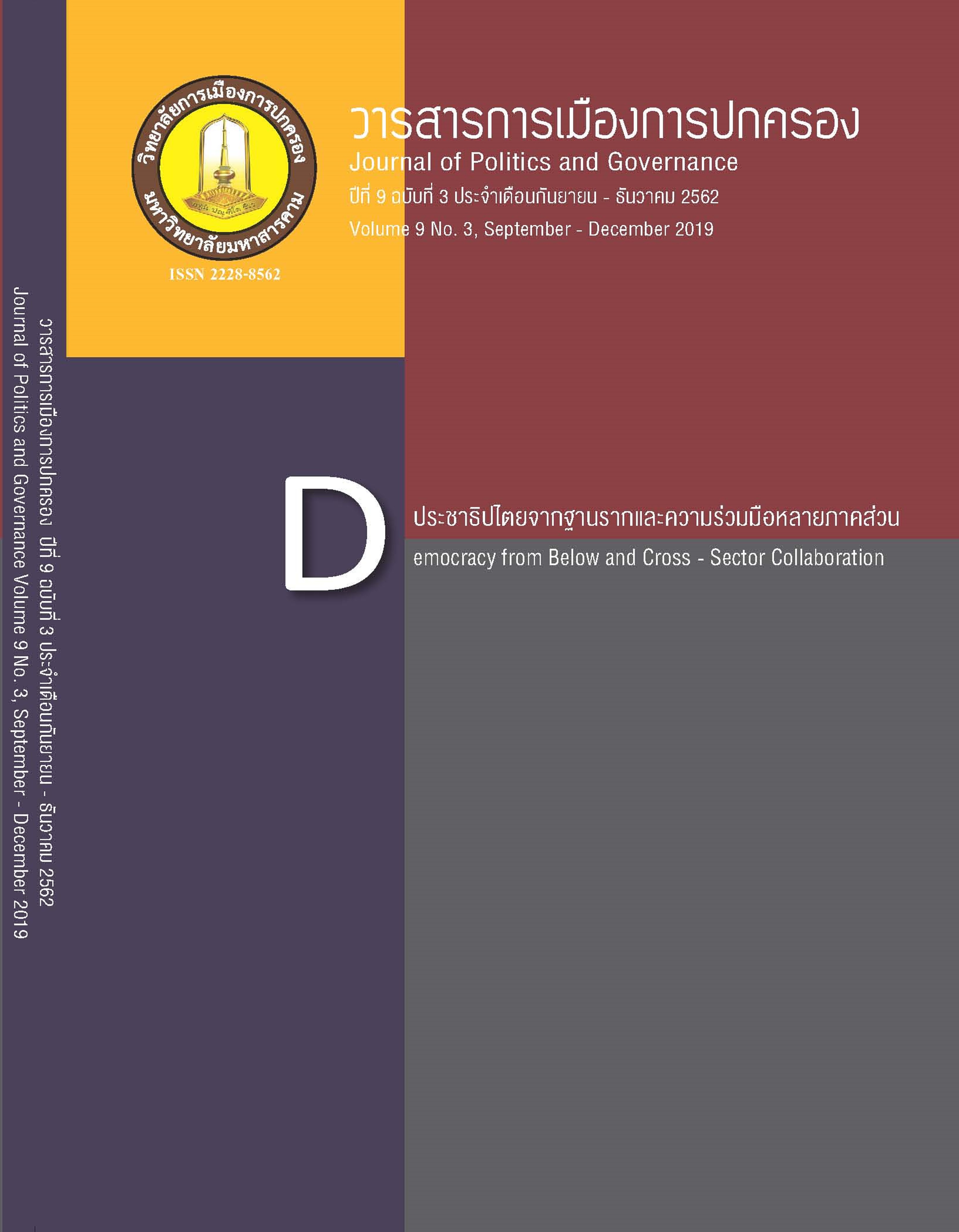Guidelines for collaborative cultural heritage governance: A case study of Sim and Hoop Taem governance at Dong Bung Sub-District, Na Dun District, Maha Sarakham Province
Main Article Content
Abstract
This study aims to (1) figure out the ways toward collaborative cultural heritage governance in the case of Sim and Hoop Taem, (2) considerate limitations in governing such cultural heritage, and (3) develop the guidelines for governing that cultural heritage. Qualitative methods including interviews and focus groups are adopted by this study. The study found that to pave the ways toward collaborative cultural heritage governance required two considerable issues. The first one (1) was the legal framework and general means that emphasised on the role of the central government, while the second one (2) was the means which paid special attention to collaboration. In this aspect, community members engaged in particular groups within the community to initiate the initial development. Their groups were supported by the collaboration of various actors in organising “Dongbung’s Sim and Hoop Taem Festival (2017)”. Regarding the limitations in governing the cultural heritage, the study found that (1) the local government could take care of surrounded environment, but could not repair the damages of Sim and Hoop Taem. (2) The development of surrounded area was not paid enough attention. (3) There have been not any learning centers or exhibitions of the heritage yet. (4) The number of local tour guides was still limited. (5) The local knowledge on drawing with natural colours was not transferred to new generation. The recommendations of Sim and Hoop Taem governance are as follows. (1) Community-based collaborative Sim and Hoop Taem governance is required. (2) Sim and Hoop Taem development should be addressed as the local policy agenda. (3) Local government should develop a community learning center that contains permanent exhibition. (4) Tourism activities should be created for promoting cultural tourism here. (5) Foundation for Sim and Hoop Taem development should be established and managed. (6) Landscape surrounding Sim should be improved to enhance its aesthetic and maintain its origin.
Article Details
References
ปวิชญา เนียมคำ. (2560). การพัฒนาหลักสูตรมรดกภูมิปัญญาทางวัฒนธรรมหนังใหญ่วัดสว่างอารมณ์ กลุ่มสาระการเรียนรู้ศิลปะ สำหรับนักเรียนชั้นมัธยมศึกษาปีที่ 5. วิทยานิพนธ์ครุศาสตร์มหาบัณฑิต มหาวิทยาลัยราชภัฏเทพสตรี.
ประเวศ วะสี. (2546). การพัฒนาต้องเอาวัฒนธรรมเป็นตัวตั้ง. กรุงเทพมหานคร: สำนักงานคณะกรรมการวัฒนธรรมแห่งชาติ กระทรวงวัฒนธรรม.แผนการกระจายอำนาจให้กับองค์กรปกครองส่วนท้องถิ่น พ.ศ. 2543 (2544, 17 มกราคม). ราชกิจจานุเบกษา. เล่มที่ 118 ตอนพิเศษ 4 ง.
รำไพพรรณ แก้วสุริยะ. (2543). การจัดการท่องเที่ยวโดยชุมชนจากทุนทางวัฒนธรรมและประวัติศาสตร์สงครามโลกครั้งที่ 2. วิทยาลัยชุมชนแม่ฮ่องสอน.
สมชาย เสียงหลาย. (มปป). บทบาทขององค์กรปกครองส่วนท้องถิ่นกับการบริหารงานวัฒนธรรม. เอกสารอัดสำเนา.
สุทธิพันธุ์ เหรา. (2556). การสื่อความหมายมรดกภูมิปัญญาทางวัฒนธรรมผ้าทอชาวไทลื้อ อำเภอปัว จังหวัดน่าน ผ่านศิลปะการแสดง.วิทยานิพนธ์ศิลปศาสตรมหาบัณฑิตสาขาวิชาการจัดการศิลปะและวัฒนธรรม. มหาวิทยาลัยเชียงใหม่.
สุนทรชัย ชอบยศ. (2560). ประวัติศาสตร์และวัฒนธรรมชุมชนดงบัง. มหาสารคาม: โรงพิมพ์อภิชาติการพิมพ์.
หทัยรัตน์ มาประณีต และเบ็ญจรัศม์ มาประณีต. (2554). การมีส่วนร่วมของผู้นำท้องถิ่นในการปกป้องคุ้มครองมรดกภูมิปัญญาทางวัฒนธรรม. คณะสังคมศาสตร์ มหาวิทยาลัยศรีนครินทรวิโรฒ.
อวยชัย ศิลปอวยชัย. (2549). การจัดการวัฒนธรรมขององค์การบริหารส่วนท้องถิ่น: ประสบการณ์จากองค์การบริหารส่วนจังหวัดแพร่. เอกสารประกอบการบรรยายเมื่อวันที่ 3 กรกฎาคม 2549 ณ ศูนย์ฝึกอบรมธนาคารไทยพาณิชย์ จังหวัดเชียงใหม่.
อุทิศ ทาหอม พิชิต วันดี และสำราญ ธุระตา. (2558). ทุนทางวัฒนธรรมและภูมิปัญญาท้องถิ่น เพื่อสร้างการมีส่วนร่วมในการจัดการทรัพยากรธรรมชาติและสิ่งแวดล้อมของชุมชนบ้านตามา จังหวัดบุรีรัมย์. วารสารการจัดการสิ่งแวดล้อม, 11(2), 47-48.


